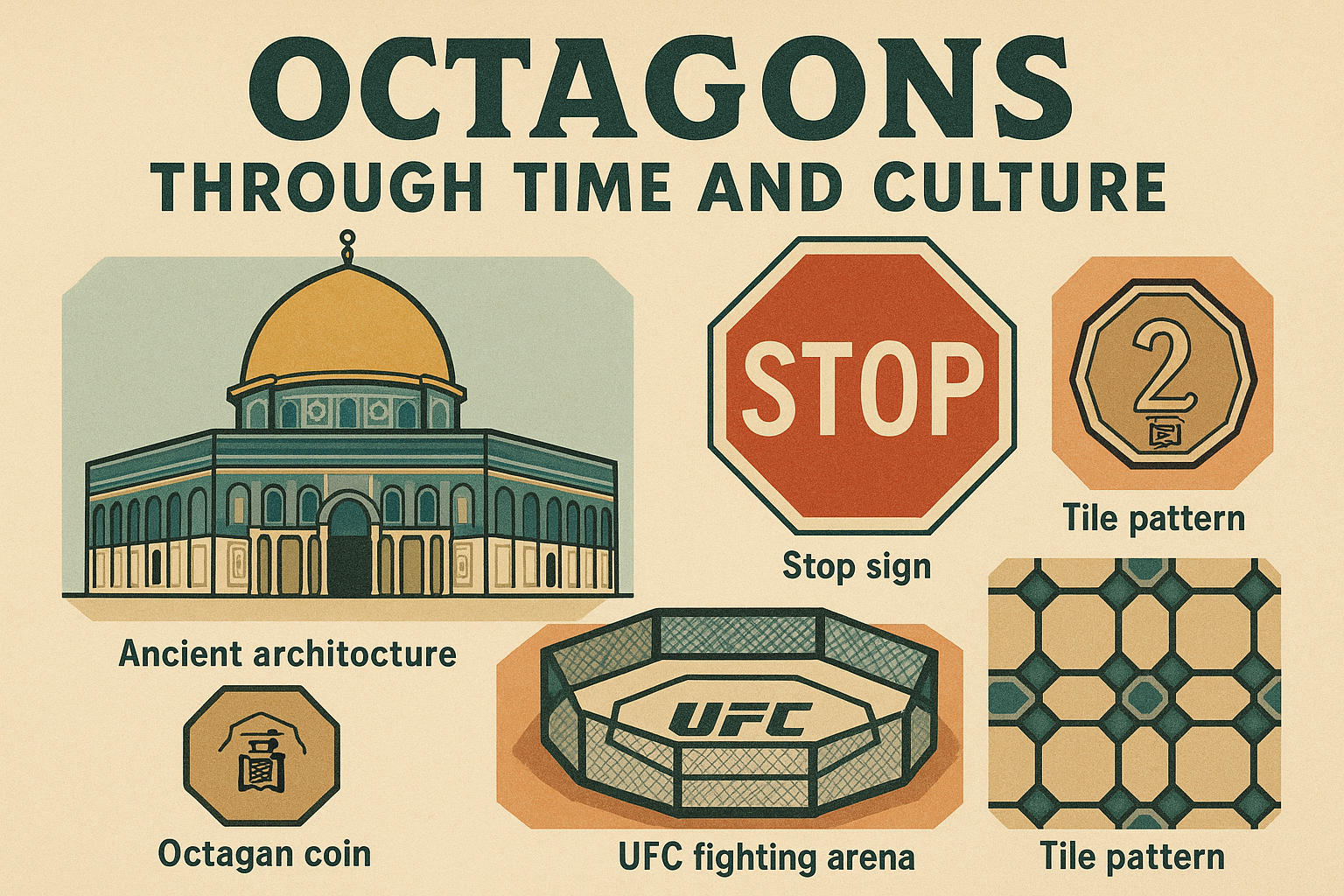Need to calculate the area of an octagon without diving into complicated formulas? Whether you're designing a floor plan, solving geometry homework, or just exploring shapes, our Octagon Area Calculator makes it fast, simple, and accurate. With just a few inputs, you’ll get precise results—plus a few insights into the fascinating world of eight-sided figures.
Want to learn more about other shapes? Try our full collection of Area Calculators.
What Is an Octagon?
Let’s begin with the fundamentals: an octagon is a polygon made up of eight sides and eight angles. There are two main variations of this shape:
-
Regular octagon – All sides and angles are identical
-
Irregular octagon – Side lengths and angles differ
When people talk about calculating the area of an octagon, they’re almost always referring to the regular type—the kind you’ll see in architecture, board games, and traffic signs.
So, why eight sides? The number eight gives the octagon a natural sense of balance that’s both practical and visually pleasing. It’s a shape that’s easy to identify, simple to construct, and surprisingly prevalent in the world around us.
When you picture an octagon, chances are you’re imagining a stop sign—a classic example of a regular octagon. And it turns out this familiar shape comes with some fascinating geometry. To calculate its area, you’ll need either the side length or the distance from the center to the flat edges (technically called the apothem in geometry).
Try out Triangle Square Footage Calculator
How to Calculate the Area of an Octagon?
To calculate the area of a regular octagon—one where all sides and angles are equal, you can use this reliable formula:
Area = 2 × (1 + √2) × a²
Here’s what it means:
- a = the length of one side
- a² = side length squared
- (1 + √2) ≈ 2.414, a constant derived from octagonal geometry
- Multiply the whole thing by 2 to account for all eight sides.
Example:
Let’s say each side of your octagon is 5 centimeters long.
Here’s how you calculate the area:
-
Square the side length:
5 × 5 = 25 -
Find the value of
(1 + √2) ≈ 2.414 -
Multiply everything:
2 × 2.414 × 25 = 120.7
Result: The area of a regular octagon with 5 cm sides is approximately 120.7 square centimeters.
This formula applies only to regular octagons, which are most common in practical applications.
Ancient Octagons: Geometry with Purpose
Long before the invention of calculators—or even formal algebra—ancient builders were already using geometric shapes with remarkable precision. One of the most compelling examples? The Dome of the Rock in Jerusalem.
Constructed around 691 AD, this iconic Islamic monument stands as one of the earliest masterpieces of monumental Islamic architecture. But here’s the lesser-known detail: its base is an octagon.
So why choose an octagon? The answer goes far beyond aesthetics. Across many cultures, the number eight has held spiritual and symbolic significance. In this case, the octagon plays a symbolic role as a bridge between the square base (representing Earth) and the circular dome (representing Heaven). This wasn’t just a design choice—it carried deep meaning and structural logic.

From an engineering perspective, the uniformity of a regular octagon helped ancient builders distribute the building’s weight evenly and naturally draw the eye upward. The result was a structure that felt harmonious, stable, and visually inspiring.
And they achieved all of this without the help of an Octagon Area Calculator.
So, the next time you enter measurements into a calculator to plan tile spacing or create a game layout, remember this: you’re continuing a tradition that stretches back over 1,300 years
Try out Pentagon Area Calculator
Fun Facts About Octagons
Think an octagon is just a cool shape used for stop signs? Think again. These eight-sided figures show up in more places than you might expect—and often for clever reasons. Here are some surprising facts that highlight the octagon’s versatility and hidden brilliance:
1. Stop Signs Use Octagons on Purpose
You’ve passed by countless stop signs, but have you ever paused to wonder why they’re shaped that way? The octagon is reserved solely for stop signs in road systems, making it instantly recognizable—even if you view it from behind. That eight-sided shape delivers a visual “STOP” before you even read the letters.
2. Octagons Are Found on Coins
Several nations feature octagonal coins, and it’s not just for looks. The distinct shape offers better grip and is easier to identify by touch. Take the Hong Kong $2 coin—it’s designed as an octagon to blend practicality with unique styling.
3. Octagons in Sacred Spaces
In sacred architecture, the octagon plays a meaningful role. It often acts as a symbolic bridge between the square (earth) and the circle (heaven), as seen in historic religious sites like the Dome of the Rock. From temples to baptismal fonts, the octagon’s spiritual geometry has been embraced across centuries and cultures.
4. The UFC’s “Octagon” Ring
That’s right—“The Octagon” is also the iconic name of the Ultimate Fighting Championship (UFC) arena. Its eight-sided shape creates a more dynamic space, giving fighters fewer corners to get trapped in and more opportunities for strategic movement than a traditional square ring.
Check out Math section to solve math quickly and easily

